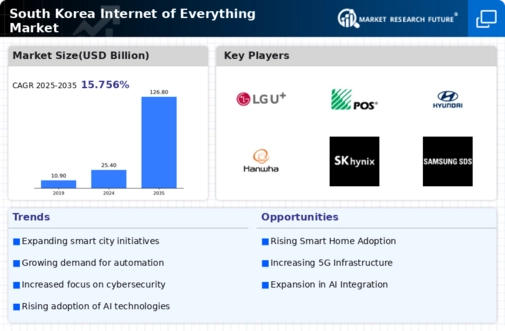Integration of AI Technologies
The integration of artificial intelligence (AI) technologies into the internet of-everything market is transforming how devices interact and function. In South Korea, AI applications are increasingly being embedded in smart home devices, industrial automation, and healthcare systems. This integration enhances the capabilities of IoT devices, allowing for predictive analytics and improved decision-making processes. The AI market in South Korea is anticipated to reach $5 billion by 2025, with a significant portion allocated to IoT applications. As businesses recognize the potential of AI to streamline operations and enhance customer experiences, the demand for AI-driven IoT solutions is likely to escalate. This trend not only fosters innovation but also positions South Korea as a leader in the internet of-everything market, driving competitive advantages across various industries.
Expansion of Smart Cities Initiatives
The development of smart cities in South Korea is a significant catalyst for the internet of-everything market. Urban areas are increasingly adopting IoT technologies to enhance public services, improve transportation systems, and optimize resource management. The government has allocated substantial funding, estimated at $15 billion, to support smart city projects over the next five years. This investment aims to create interconnected urban environments that leverage data to improve quality of life. As smart city initiatives expand, the demand for IoT solutions in areas such as traffic management, waste management, and public safety is expected to rise. This trend not only fosters innovation but also positions South Korea as a pioneer in the internet of-everything market, attracting global attention and investment.
Growing Focus on Sustainable Solutions
Sustainability has emerged as a pivotal driver within the internet of-everything market in South Korea. As environmental concerns gain prominence, businesses and consumers alike are increasingly seeking eco-friendly solutions. The government has set ambitious targets for reducing carbon emissions, which has led to the adoption of smart energy management systems and sustainable manufacturing practices. The market for green IoT solutions is projected to grow by 25% annually, reflecting a shift towards more responsible consumption. This focus on sustainability not only aligns with global trends but also enhances the reputation of companies operating within the internet of-everything market. By prioritizing sustainable practices, businesses can attract environmentally conscious consumers and contribute to a greener future.
Rising Demand for Connectivity Solutions
The internet of everything market in South Korea experiences a notable surge in demand for connectivity solutions. As urbanization accelerates, the need for seamless communication between devices becomes paramount. The government has invested heavily in enhancing network infrastructure, aiming for 5G coverage across the nation. This investment is projected to reach approximately $10 billion by 2026, facilitating the integration of smart devices into everyday life. Enhanced connectivity not only supports individual consumers but also empowers businesses to optimize operations through real-time data exchange. Consequently, the proliferation of IoT devices is expected to grow by 30% annually, indicating a robust trajectory for the internet of-everything market. This trend underscores the critical role of connectivity in driving innovation and efficiency across various sectors.
Increased Investment in Cybersecurity Measures
As the internet of-everything market expands, the need for robust cybersecurity measures becomes increasingly critical. In South Korea, the rise in connected devices has led to heightened concerns regarding data privacy and security breaches. The government has recognized this challenge and is investing approximately $2 billion in cybersecurity initiatives to protect IoT ecosystems. This investment aims to develop advanced security protocols and frameworks that safeguard sensitive information. As businesses and consumers become more aware of cybersecurity risks, the demand for secure IoT solutions is likely to grow. This focus on cybersecurity not only enhances consumer trust but also strengthens the overall resilience of the internet of-everything market, ensuring its sustainable growth.
















